Life Sciences News
See our Latest Journal Publications
“The future of women in STEM is bright but not secure”: Warwick climate scientist
Four female climate scientists from India, Pakistan, and Bangladesh — who are currently pursuing postgraduate studies in Life Sciences thanks to ‘Women in STEM’ scholarships between the University of Warwick and the British Council — share their experiences and reflections on the International Day of Women and Girls in Science 2022.
Press release (11 February 2022)
Warwick Women in Science event - Friday 11 February 2022
On Friday 11 February Anna Ceesay a second year Biochemist, and Outreach Officer for Warwick's Biological Society, is joining a Virtual Q&A panel to celebrate Women in Science at Warwick. The day marks the sixth International Day of Women and Girls in Science; a day designed to promote full and equal access to, and participation in, science for women and girls. The live panel event will give the opportunity to meet some of the women in our Faculty of Science, Engineering and Medicine, and ask them any questions about Science at Warwick. Find out more
Compounds made from ‘digested’ molecules feeds appetite for greener pharmaceuticals and agrochemicals
A method of producing vital chemical building blocks for use in the pharmaceutical and agrochemical industries that mimics how plants manufacture them has been developed by a team at the Warwick Integrative Synthetic Biology Centre. The new method uses enzymes to produce indolic amides, carboxylic acids and auxins – vital for use in pharmaceutical and agrochemical industries.
Press Release (1 February 2022)
Study estimates death toll of antibiotic-resistant bacteria - Warwick experts comment
A new Lancet study shows that over a million people died in 2019 from infections caused by bacteria resistant to antibiotics. Dr Freya Harrison and Dr Antonia Sagona comment on the importance of this new evidence and the need to tackle the issue of antibiotic resistance urgently.
Expert Comment (20 January 2022)
Poolbeg Pharma licences first-in-class broad spectrum RNA-based immunotherapy for respiratory virus infections from the University of Warwick
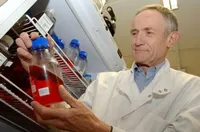 Poolbeg Pharma, a clinical stage infectious disease pharmaceutical company, has in-licenced a novel, first-in-class RNA-based immunotherapy for respiratory virus infections.
Poolbeg Pharma, a clinical stage infectious disease pharmaceutical company, has in-licenced a novel, first-in-class RNA-based immunotherapy for respiratory virus infections.
Poolbeg has secured an exclusive licence to this dual antiviral prophylactic and therapeutic candidate, which is at a late-pre-clinical development stage. The candidate, which will be developed by Poolbeg as POLB 002, was developed at the
Press release (17 January 2022)
Digging for Britain - DNA testing
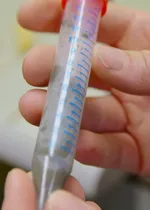 On 5 January Professor Robin Allaby featured in the BBC's Digging for Britain programme. He discussed the DNA testing of sediment from a Mesolithic settlement located on the seabed of the Solent. The analysis determined what was being eaten by the Mesolithic people. The appearance of wheat, 2000 years earlier than previously accepted was a major revelation.
On 5 January Professor Robin Allaby featured in the BBC's Digging for Britain programme. He discussed the DNA testing of sediment from a Mesolithic settlement located on the seabed of the Solent. The analysis determined what was being eaten by the Mesolithic people. The appearance of wheat, 2000 years earlier than previously accepted was a major revelation.
Watch on iPlayer (from 46:10)
New health economic framework to help assess what might be required to eliminate African sleeping sickness by 2030
An international group of researchers have created a new health economic framework that supports decision makers and funders in understanding the resources required to achieve the World Health Organization’s (WHO) goal of eliminating sleeping sickness by 2030.
Press release (13 December 2021)
Vacancies - Assistant or Associate Professor in Life Sciences
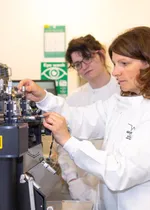 We have three positions available for Assistant or Associate Professor to join the School of Life Sciences (SLS). We are looking for individuals who are capable of developing innovative and original research programmes that address current and future challenges in life science, such as environmental change, sustainable intensification, biology of disease, neuroscience, understanding whole organism dynamics or engineering biology.
We have three positions available for Assistant or Associate Professor to join the School of Life Sciences (SLS). We are looking for individuals who are capable of developing innovative and original research programmes that address current and future challenges in life science, such as environmental change, sustainable intensification, biology of disease, neuroscience, understanding whole organism dynamics or engineering biology.
Closing date: Sunday 16 January 2022.
The Vegetables of Christmas Future
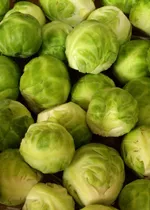 If you think about a traditional Christmas dinner, there’s turkey with pigs in blankets, or maybe you prefer a nut roast. But the rest is vegetables. A large proportion of our plate should be covered in vegetables, and the standard winter varieties, like carrots and sprouts, are grown very successfully in the UK.
If you think about a traditional Christmas dinner, there’s turkey with pigs in blankets, or maybe you prefer a nut roast. But the rest is vegetables. A large proportion of our plate should be covered in vegetables, and the standard winter varieties, like carrots and sprouts, are grown very successfully in the UK.
But will this always be the case? Climate change is bringing with it new challenges as well as making known pests and diseases more difficult to tackle. Scientists at Warwick's Crop Centre, are working to understand the pests and diseases of the some of the UK’s major crops and developing new resistant varieties, using traditional plant breeding and genetic expertise.
Read the Knowledge Centre Article (1 December 2021)
Excellence in Equality, Diversity and Inclusion Award winners
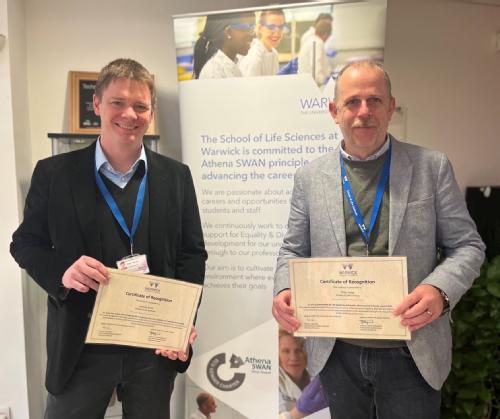 Professor Johannes Boltze and Professor Phil Young both received commendation at the inaugural Excellence in Equality, Diversity and Inclusion Awards. These awards recognise the outstanding contribution to the enhancement of equality, diversity and inclusion, and a commitment to building more inclusive environments and experiences through everyday behaviours at the University of Warwick.
Professor Johannes Boltze and Professor Phil Young both received commendation at the inaugural Excellence in Equality, Diversity and Inclusion Awards. These awards recognise the outstanding contribution to the enhancement of equality, diversity and inclusion, and a commitment to building more inclusive environments and experiences through everyday behaviours at the University of Warwick.
Find out more
5 questions with Johannes Boltze - find out about the work and story behind his award.
COP26 – reflections on attending as an Observer from Warwick
 Professor Hendrik Schafer shares his reflections on attending COP26:
Professor Hendrik Schafer shares his reflections on attending COP26:
"When I was asked whether I’d want to be part of the delegation that the University sends to COP26 in Glasgow, I did not have to think about it for long, after all, Climate Change is the biggest challenge that we are facing as global human society. Although I only spent two days at COP, I look back at this as a positive and worthwhile activity.
Despite disappointment about the watered-down COP26 declaration, I think that COP26 has brought some progress overall. There is an increased sense of urgency and political will to start tackling the issue, and although I personally think that we need much faster and more ambitious action, any progress is welcome and significant. Annual submissions of national action plans will hopefully lead to increasing pressure on countries to accelerate action rather than delaying it, but the acid test will be whether actions will lead to a slowdown in greenhouse-gas emissions over the next few years.
Another important milestone is that protection and regeneration of natural ecosystems such as forests, mangroves, saltmarshes and seagrass meadows is finally recognised by COP as an important part of the strategy to combat climate change. Those coastal marine ecosystems, which are referred to as ‘blue carbon’ environments are incredibly effective carbon sinks, whose protection will not only ensure a contribution to carbon sequestration but enhance biodiversity and deliver a raft of positive ecosystem services. Nevertheless, there is a need to understand in more detail, how these ecosystems will respond to climate change and to monitor their actual C sequestration. These are research activities that we are in a good position to contribute to with several groups studying relevant environmental processes and trace gases. Another area that is getting more attention is the carbon footprint of agriculture, again an area where we have critical expertise and where SLS researchers can make contributions to the research agenda.
Whilst those are important areas where a more detailed scientific understanding is required, the basic science background of climate change has been clear for too long, with no sense of urgency and too little action. The key question is how we get society to make the changes that are required. I believe that creating a dialogue between citizens, scientists, business, and government at various levels will be vital for driving positive changes. There have been excellent examples at COP26 that illustrate the critical role of positive communication and citizen involvement and how these can lead to the creation of action plans at local and regional level with positive outcomes for local communities. It needs a few success stories that deliver positive change in quality of life and sustainability, which will hopefully increase the roll out of programmes for mitigation and adaptation measures, especially if there is a demand and acceptance from the public for positive action. The University is already looking at opportunities to engage with local community and governments to enhance sustainability in the region.
There is huge potential across the university to be a centre for climate action, going well beyond the research on innovation in the automotive sector, but also in the humanities, arts, economics, and of course Life Sciences."
Prof Murray Grant selected as Leading Light for Kindness
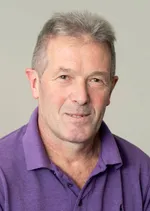 Congratulations to Professor Murray Grant, Elizabeth Creak Chair in Food Security, who has been selected by an external panel as one of the 2021 Kindness and Leadership Leading Lights in the UK. The awards recognise 50 leaders driving positive change through the power of kindness.
Congratulations to Professor Murray Grant, Elizabeth Creak Chair in Food Security, who has been selected by an external panel as one of the 2021 Kindness and Leadership Leading Lights in the UK. The awards recognise 50 leaders driving positive change through the power of kindness.
Find out more
Gold medal for Warwick iGEM team
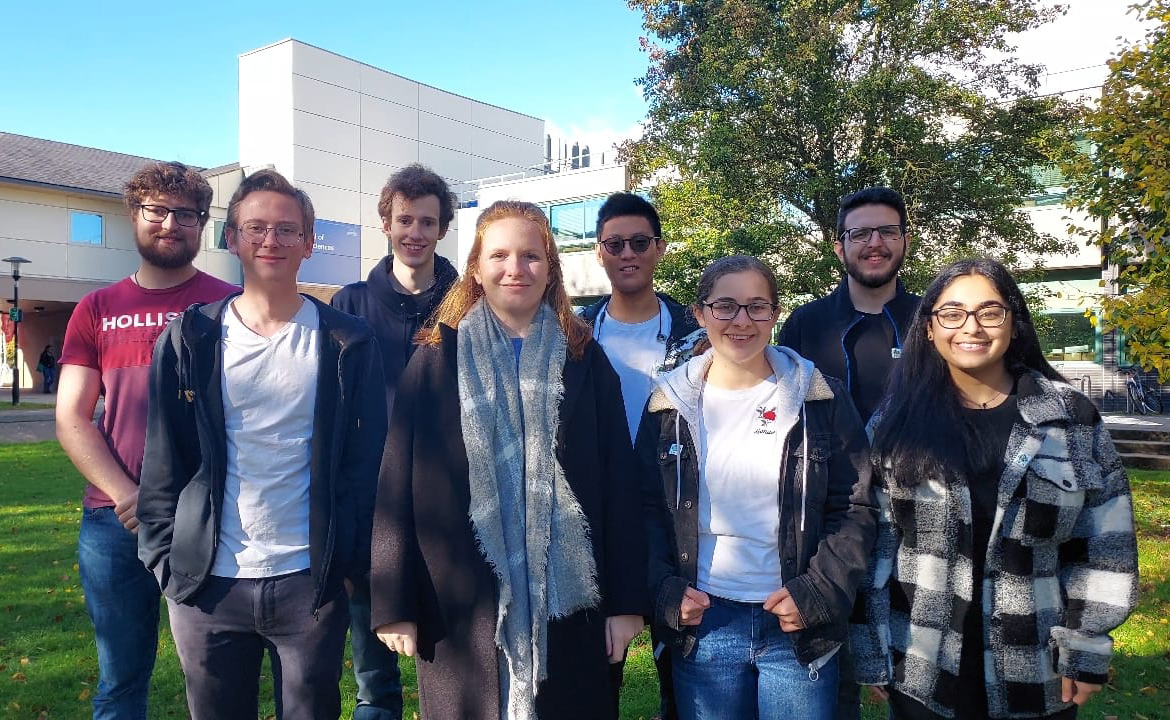
The Warwick iGEM 2021 team attended the iGEM Giant Jamboree in Paris on 11-14 November, where they were awarded a Gold Medal for their project, as well as receiving a nomination for the Best Model Special Prize.
iGEM is an international genetic engineering competition that fosters scientific research and education by creating a community of young student researchers. This year, 352 teams from over 45 countries took part in the competition.
Warwick’s 2021 team, CREscent, attempted to design a rapid detection method for a type of bacteria resistant to carbapenems, a last-resort antibiotic. These bacteria are often found in hospitals, and infections are extremely difficult to treat so isolation of infected patients is one of the only ways to contain its spread. Current detection methods for Carbapenem Resistant Enterobacteriaceae (CRE) are very slow and can take up to 4 days to return a positive result, exposing hospitals to potential unchecked spread of CRE in the meantime.
Therefore, the team designed rapid detection method for hospitals, by targeting a carbapenem resistance gene in E. coli using CRISPR. If the RNA molecule produced by this gene is detected, a different RNA is transcribed, which causes fluorescence. This acts as a visual identifier. The idea was that a swab would be taken in a hospital and placed into a test tube. If the bacteria present are resistant to carbapenems then the tube will glow green under UV light.
Read more about the project
CTP programme for Sustainable Agricultural Innovation - funded PhD project opportunity
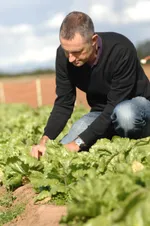 The UKRI and Biotechnology and Biological Sciences Research Council (BBSRC) has awarded a Collaborative Training Partnership (CTP) grant to a consortium led by G’s Growers Ltd. The CTP programme for Sustainable Agricultural Innovation (CTP-SAI) is a groundbreaking partnership between leading businesses, charities and research providers to offer outstanding training for the agri-food sector.
The UKRI and Biotechnology and Biological Sciences Research Council (BBSRC) has awarded a Collaborative Training Partnership (CTP) grant to a consortium led by G’s Growers Ltd. The CTP programme for Sustainable Agricultural Innovation (CTP-SAI) is a groundbreaking partnership between leading businesses, charities and research providers to offer outstanding training for the agri-food sector.
Through this programme, the University of Warwick is offering a PhD enabling the successful candidate to gain a wide range of experience in conventional and molecular plant pathology and also of microbial community analyses through next generation sequencing approaches. This PhD is a unique opportunity to blend research techniques from lab to field and work with one of Europe’s biggest lettuce producers. The project on 'Integrated control of Fusarium wilt of lettuce in relation to pathogen and microbial community dynamics' will be supervised by Professor John Clarkson (SLS) and Dr Helen Bates (NIAB).
The deadline for applications is 8 April 2022.
Professor Hendrik Schaefer is part of expert delegation attending COP26
 Environmental microbiologist Professor Hendrik Schaefer is one of 17 University of Warwick delegates taking their expertise to COP26. The university is one of a limited number of institutions to have been granted official observer status by the UN-led conference, which is being hosted by the UK.
Environmental microbiologist Professor Hendrik Schaefer is one of 17 University of Warwick delegates taking their expertise to COP26. The university is one of a limited number of institutions to have been granted official observer status by the UN-led conference, which is being hosted by the UK.
Press release (20 October 2021)
Warwick COP26 researchers and academic experts attending announced (28 October 2021)
Dr Freya Harrison wins WH Pierce Prize 2021
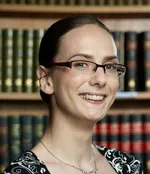 Dr Freya Harrison has been awarded the WH Pierce Prize 2021 by the Society for Applied Microbiology for her work in translating medieval literature and medical texts to uncover ancient antimicrobial recipes.
Dr Freya Harrison has been awarded the WH Pierce Prize 2021 by the Society for Applied Microbiology for her work in translating medieval literature and medical texts to uncover ancient antimicrobial recipes.
Press release (14 October 2021)
Arctic Drift: A Year in the Ice - watch the documentary on 16 October
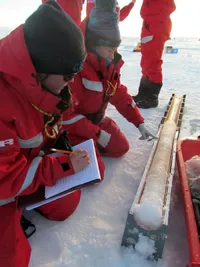 On Saturday 16 October 2021 at 6:30pm, Channel 4 will be showcasing the documentary 'Arctic Drift: A Year in the Ice', covering the goal of MOSAIC and the science undertaken during the Expedition.
On Saturday 16 October 2021 at 6:30pm, Channel 4 will be showcasing the documentary 'Arctic Drift: A Year in the Ice', covering the goal of MOSAIC and the science undertaken during the Expedition.
In September 2019, the icebreaker RV Polarstern left her home port in Bremerhaven to sail north. Her goal was to act as the Multidisciplinary drifting Observatory for the Study of Arctic Climate (MOSAiC), the largest Arctic Research Expedition ever undertaken, with the collaboration of over 80 institutions from 20 countries, to study both winter and summer processes and relationships between ocean, ice and atmosphere.
University of Warwick SLS scientists Dr Alison Webb, Professor Hendrik Schaefer and Professor Yin Chen, undertook the 'Sea Ice Microbiology and the Role in Cycling of Sulfur' (SIMbRICS) Project during the second half of MOSAiC. Overall, this project, in collaboration with the University of Groningen (NL) and the University of East Anglia (UK), aimed to study the in-situ production of the climate-relevant biogenic gas dimethylsulfide (DMS) and to link this with the diversity of the microbial community.
As the sea ice transitioned from the long Arctic winter, through a short spring to summer of 24 hours of daylight, ice melt created a highly variable environment of meltponds and a stratified surface ocean, which changed again through the onset of autumn. These changes create a high stress environment for the microbiome and the SIMbRICS project is investigating how these changing conditions affect the production of climate-relevant trace gases such as DMS.
New research giving insight into the persistence of highly contagious foot-and-mouth disease virus features on front cover of Science Magazine
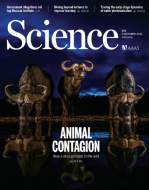 A major new study, featured on the cover of Science Magazine today (1 October 2021), undertaken by Dr Erin Gorsich and colleagues at The Pirbright Institute, Oregon State University, Onderstepoort Veterinary Institute and SANParks, Veterinary Wildlife Services, Kruger National Park explores the mechanisms at play that enable the persistence of highly infectious pathogens in their host populations, a major problem in endemic disease ecology.
A major new study, featured on the cover of Science Magazine today (1 October 2021), undertaken by Dr Erin Gorsich and colleagues at The Pirbright Institute, Oregon State University, Onderstepoort Veterinary Institute and SANParks, Veterinary Wildlife Services, Kruger National Park explores the mechanisms at play that enable the persistence of highly infectious pathogens in their host populations, a major problem in endemic disease ecology.
Press release (1 October 2021)
SLS researcher named as Turing Fellow
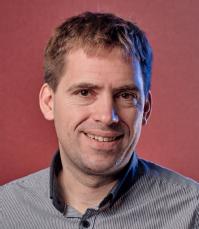 Congratulations to Professor Mike Tildesley on being named as a Fellow of the Alan Turing Institute this year.
Congratulations to Professor Mike Tildesley on being named as a Fellow of the Alan Turing Institute this year.
Press release (30 September)
Researcher on fast track thanks to dementia charity founded by F1 legend
Dr Emily Hill, a School of Life Sciences researcher investigating Alzheimer’s disease, has been named as one of four new Race Against Dementia Fellows, with the opportunity to receive support from not only leading scientists studying dementia, but also experts in innovation and problem solving from the world of Formula 1.
Press release (23 September 2021)
